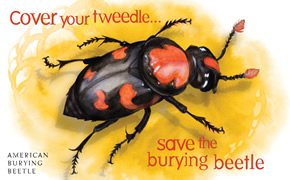
|
Group Gives Out 100,000 Endangered Species Condoms for Valentine's Day
Educational Project Highlights Impact of Human Overpopulation on Wildlife
Five People to Win Lifetime Condom Supply
February 11, 2010 - TUCSON, Ariz. - With 3,000 volunteers operating in all 50 states, the Center for Biological Diversity will distribute 100,000 free Endangered Species Condoms beginning on Valentine's Day and has launched an educational Web site -
www.EndangeredSpeciesCondoms.com - chronicling the devastating impact of human overpopulation on endangered species. Additional free condoms will be distributed through the site, and five people will win a lifetime condom supply.

Six different packages with original artwork and edgy slogans feature the polar bear ("Wrap with care, save the polar bear"), jaguar ("Wear a jimmy hat, save the big cat"), American burying beetle ("Cover your tweedle, save the burying beetle"), snail darter ("Hump smarter, save the snail darter"), coquí guajón rock frog ("Use a stopper, save the hopper"), and spotted owl ("Wear a condom now, save the spotted owl"). All six species are listed as threatened or endangered by the U.S. Fish and Wildlife Service.

"Human overpopulation is destroying wildlife habitat at an unprecedented rate," said Randy Serraglio, a conservation advocate leading the Center's overpopulation campaign.
"All of the major threats to the earth's biodiversity - sprawl, logging, mining, dams, pollution, and climate change - are driven by human overpopulation. Our Endangered Species Condoms are designed to capture peoples' attention, get them laughing, and get them talking about the impact of overpopulation on our small and fragile planet."

The Endangered Species Condoms will be distributed in bars, supermarkets, schools, concerts, parties, and other public events by grandmothers, college students, university professors, health-care providers, ministers, rock bands, and people from all walks of life.
"We've been overwhelmed with volunteers," said Serraglio. "We expected 100, but got over 3,000 in just a month. The demand far exceeded our first run of 100,000 condoms. We'll be producing another 100,000 as soon as the first batch hits the streets."

The human population stands at 6.8 billion and is projected to reach at least 9 billion by 2050. "Without universal access to free birth control and engaging public education about the serious consequences of overpopulation, the global population could reach 15 billion by mid-century," said Serraglio. "The Earth simply can't sustain that many people and provide a high-quality life for all species, including humans."

The current extinction rate is about 1,000 times the normal background rate that has existed for hundreds of millions of years. "Unlike previous mass extinctions, which were the result of cosmic or geologic catastrophes, this one is being caused by a single species: human beings," said Serraglio. "With a little more thoughtfulness and responsibility for our reproductive behavior, we can ensure future generations inherit a world that's still full of a diversity of life."

"Through the empowerment of women, universal, free access to birth control for everyone who wants it, and education of all people, we can stabilize global population at a sustainable level," said Serraglio. "The United States, which has the highest population growth of any developed nation and extremely high consumption levels, is a key factor in this problem. We should be taking the lead in promoting policies that will stabilize global population."
The Center's new Web site - www.EndangeredSpeciesCondoms.com - has images of the six colorful condom packages, information on how overpopulation is impacting climate change, global fisheries collapse, public lands, and the extinction crisis. It allows people to sign up to become Endangered Species Condom distributors in their own neighborhoods and to enter a contest to win free condoms for life.
On the web:
www.EndangeredSpeciesCondoms.com
www.biologicaldiversity.org/campaigns/overpopulation/index.html
###
CONTACT:
Randy Serraglio,
(520) 784-1504
rserraglio@biologicaldiversity.org
Source: Center for Biological Diversity
http://www.biologicaldiversity.org/news/press_releases/2010/condoms-02-11-2010.html
"Reproduced with permission - Center for Biological Diversity "
Center for Biological Diversity
|
 |